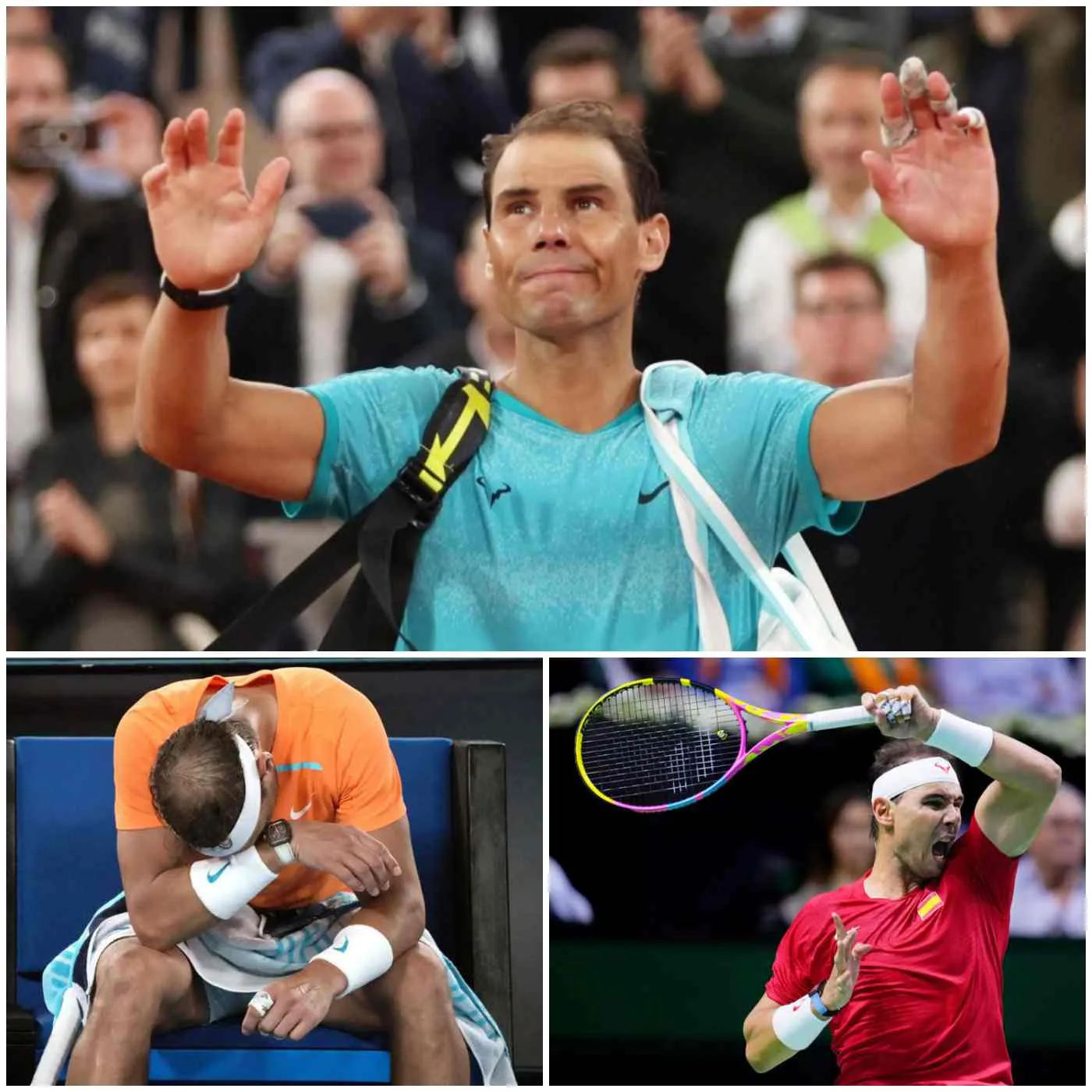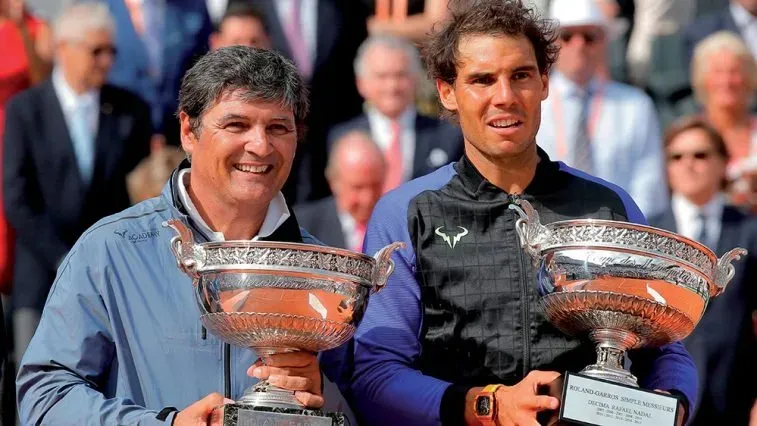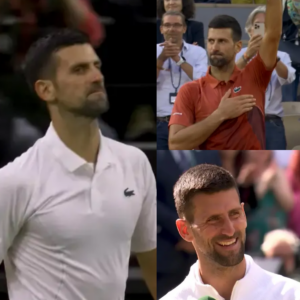Rafael Nadal, often referred to as the “King of Clay,” is one of the greatest tennis players of all time. His journey to greatness is not only defined by his remarkable achievements on the court but also by his incredible work ethic, resilience, and passion for the game. From his early days in Mallorca to becoming a global icon, Nadal’s story is a testament to dedication, perseverance, and the relentless pursuit of excellence.
Rafael Nadal was born on June 3, 1986, in Manacor, a small town on the Spanish island of Mallorca. Raised in a sports-oriented family, Nadal’s father, Sebastián, was a businessman and a keen tennis fan, while his uncle, Toni Nadal, would play a crucial role in his development as a tennis player. Nadal began playing tennis at the age of three, and by the time he was eight years old, he was already competing in local tournaments. His natural athleticism, combined with a love for the sport, was evident from the very beginning.

Nadal’s talent did not go unnoticed, and by the time he was 12, he was already a promising tennis player. His uncle Toni Nadal recognized his potential and began to focus more on developing his nephew’s game. At just 14 years old, Nadal made the decision to switch from playing junior tennis to competing professionally, a move that would prove to be the foundation of his illustrious career.

Rafael Nadal made his professional debut in 2001, at the age of 15, but it wasn’t until 2003 that he truly began to make his mark. That year, Nadal broke into the ATP Top 100, and his breakthrough year came in 2005 when he won his first French Open title at the age of 19. This victory catapulted Nadal into the tennis spotlight, and he quickly became known for his relentless style of play, powerful forehand, and fierce competitiveness.
The 2005 French Open victory was just the beginning of Nadal’s dominance on clay courts. Over the years, he would go on to win an unprecedented 14 French Open titles, solidifying his legacy as the greatest clay court player in history. His success on the clay court was unparalleled, earning him the nickname “King of Clay.” However, his greatness extended far beyond just one surface.
While Nadal’s dominance on clay is well known, his success on other surfaces is equally impressive. His intense rivalry with Swiss tennis legend Roger Federer and Serbian powerhouse Novak Djokovic defined an entire era of tennis. Nadal’s matches against Federer, in particular, were historic, with their battles in Wimbledon, the US Open, and other Grand Slam tournaments capturing the imaginations of tennis fans around the world.
Nadal’s ability to adapt his game to various surfaces — from grass to hard courts — made him an all-court player. In addition to his record on clay, Nadal has won numerous Grand Slam titles on hard courts and grass. His victory at Wimbledon in 2008, after a grueling five-set match against Federer, is widely considered one of the greatest matches in tennis history. Nadal also secured his first US Open title in 2010 and his first Australian Open title in 2009, further solidifying his status as a tennis legend.
Throughout his career, Nadal has faced numerous injuries, many of which have threatened to derail his journey to greatness. His aggressive playing style, combined with his relentless work ethic, has put a significant strain on his body. Despite the setbacks, Nadal has repeatedly demonstrated remarkable resilience, coming back from injuries stronger than before.
In 2009, Nadal faced knee problems that caused him to miss several months of tennis, but he returned to win the French Open in 2010. Similarly, after struggling with a wrist injury in 2016, many wondered if Nadal’s career might be nearing its end. Yet, he bounced back to win the French Open again in 2017 and 2018, proving that his passion for the sport and his unbreakable spirit would always drive him forward
His comeback from injuries is a testament to his physical and mental toughness. Nadal’s determination to overcome obstacles and defy the odds has made him an inspiration to millions around the world. His perseverance through adversity is a key part of what makes his journey so remarkable.
As of 2024, Nadal’s career is a masterpiece of achievements, setting numerous records along the way. He has won 22 Grand Slam singles titles, including an unparalleled 14 French Open titles, and has been a constant presence at the top of the ATP rankings. He is one of only a few players to have completed a career Grand Slam, having won each of the four major titles at least once.
However, Nadal’s legacy extends far beyond the titles and trophies. His work ethic, dedication, and sportsmanship have set an example for future generations of tennis players. Nadal’s humility and respect for the sport and his competitors have earned him admiration from fans and peers alike. His commitment to fair play and his graciousness in both victory and defeat have made him one of the most respected athletes in the world.
Nadal’s influence reaches beyond the tennis court. He has been a powerful ambassador for the sport, inspiring millions with his passion and drive. His charitable work, especially through his Rafa Nadal Foundation, which focuses on providing educational opportunities and sports programs for disadvantaged children, has had a lasting impact.
Nadal’s success has also helped raise the profile of tennis in Spain, contributing to the country’s rise as a tennis powerhouse. His triumphs have inspired countless young athletes, particularly in Spain and Latin America, where tennis is a growing sport.
Rafael Nadal’s journey to greatness is a story of triumph over adversity, of relentless hard work and dedication to the sport he loves. From his early years in Mallorca to his unparalleled dominance on clay courts, Nadal’s career has been nothing short of extraordinary. Through injuries, rivalries, and the challenges of an intense professional tennis career, Nadal has continued to push the boundaries of what is possible, cementing his place as one of the greatest players of all time.
As he continues to compete at the highest level, Nadal’s journey is far from over. His passion, work ethic, and resilience will undoubtedly inspire generations of athletes and fans alike for years to come. Rafael Nadal’s legacy is not only defined by his achievements but by the way he has embodied the spirit of tennis, making him a true legend of the sport.
News
Novak Djokovic experiences his first sub-top-250 defeat since 2010!
Numbers do not always give the correct information! We saw that on Friday at the Brisbane International when world no. 293 Reilly Opelka stunned the 24-time Major winner, Novak Djokovic. Reilly ousted his idol 7-6, 6-3 in an hour and…
‘Novak Djokovic will challenge Sinner, Zverev, Alcaraz,’ says Musetti
After many notable years at Majors, Novak Djokovic did not lift a notable trophy in 2024. The 24-time Major champion is alone at the top, leaving Rafael Nadal at 22 following a stellar performance in 2023. Despite that, Djokovic is…
Novak Djokovic tips his hat to Reilly Opelka after Brisbane defeat
Novak Djokovic kicked off the new season at the ATP 250 event in Brisbane. The Serb competed at this event for the first time since 2009 and failed to chase the milestone 100th ATP title. Novak suffered a 7-6, 6-3…
Novak Djokovic And Mother Jelena’s Reaction Was Surprising.
Novak Djokovic, the Serbian tennis superstar, is a name that resonates worldwide, not only for his incredible achievements on the court but also for his remarkable persona off it. Djokovic has long been an open book about his personal life,…
“WHAT I NEED MOST NOW IS REST” Djokovic Suddenly Made A Shocking Statement At The End Of His Career.
Novak Djokovic, one of the greatest tennis players of all time, recently made headlines with a startling admission regarding his future in the sport. As he nears the end of an illustrious career that has seen him secure numerous Grand…
Nadal Breaks Down in Tears as His Wife and Son Visit Him on His Final Tour: ‘He Missed His Father’.Details In The Comments 👇👇
In the world of professional sports, moments of pure emotion often surface, revealing the human side of athletes who are usually seen as invincible figures. One such touching moment came recently involving tennis legend Rafael Nadal. Known for his relentless…
End of content
No more pages to load











